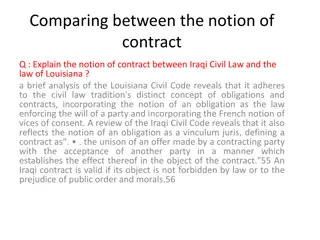Homogeneous Systems of Linear Equations
Homogeneous linear equations are systems in which the constant term in each equation is zero. They can have one or infinitely many solutions but always have at least one solution. Learn how to solve homogeneous systems, distinguish between trivial and nontrivial solutions, and understand null space
5 views • 12 slides
Singular Value Decomposition and the Conjugate Gradient Method
Singular Value Decomposition (SVD) is a powerful method that decomposes a matrix into orthogonal matrices and diagonal matrices. It helps in understanding the range, rank, nullity, and goal of matrix transformations. The method involves decomposing a matrix into basis vectors that span its range, id
6 views • 21 slides
Homogeneous Systems of Linear Equations
Homogeneous linear equations consist of a system where the constant terms in every equation are 0. They can have one or infinitely many solutions, with at least one solution always present. Learn how to solve these systems, distinguish trivial and nontrivial solutions, and explore the concepts of nu
3 views • 12 slides
Rank and Nullity in Linear Algebra
The rank of a matrix is the maximum number of linearly independent columns, while the nullity is obtained by subtracting the rank from the number of columns. Linearly independent columns form the basis for the rank of a matrix, helping determine if a given matrix has a unique solution, infinite solu
1 views • 6 slides
Grounds of Nullity of Marriage and Incapacity in Marriage Cases
This content discusses various grounds for nullity of marriage, including lack of use of reason and incapacity as per Canon Law 1095. Case examples highlight situations where individuals were deemed incapable of contracting a valid marriage due to mental health issues or impaired judgment. The impor
2 views • 29 slides
Comparative Analysis of Contract Notions in Iraqi Civil Law and Louisiana Law
Iraqi Civil Law and Louisiana Law both outline the notion of contract, emphasizing obligations and consent. The Iraqi Civil Code defines a contract as a unison of offer and acceptance, while the Louisiana Civil Code incorporates French principles of vices of consent. Both legal systems require valid
2 views • 6 slides
Understanding Matrix Rank and Variables
Explore the concept of matrix rank, independent columns, basic and free variables, and the relationship between them. Learn how to determine the rank, pivot columns, and nullity of a matrix using key equations and properties. Understand the significance of rank and variables in linear algebra and ma
1 views • 7 slides
Linear Equations and Homogeneous Systems
Learn about homogeneous linear equations, null space, nullity of a matrix, Sylvester's law of nullity, and how to solve homogeneous systems of linear equations. Understand the concept of trivial and nontrivial solutions in a linear system where all constant terms are zero. Discover the properties of
2 views • 12 slides







